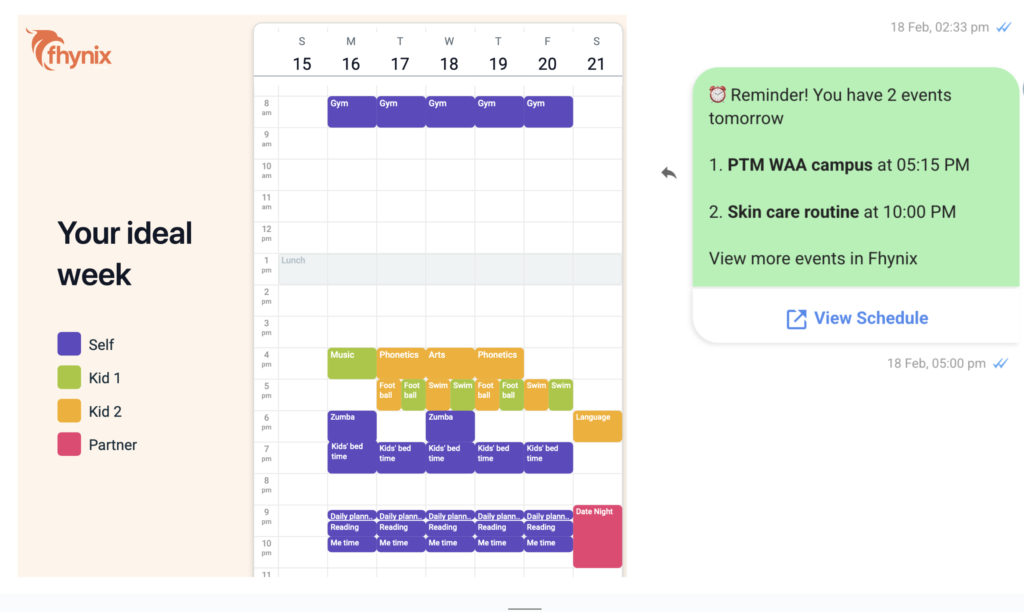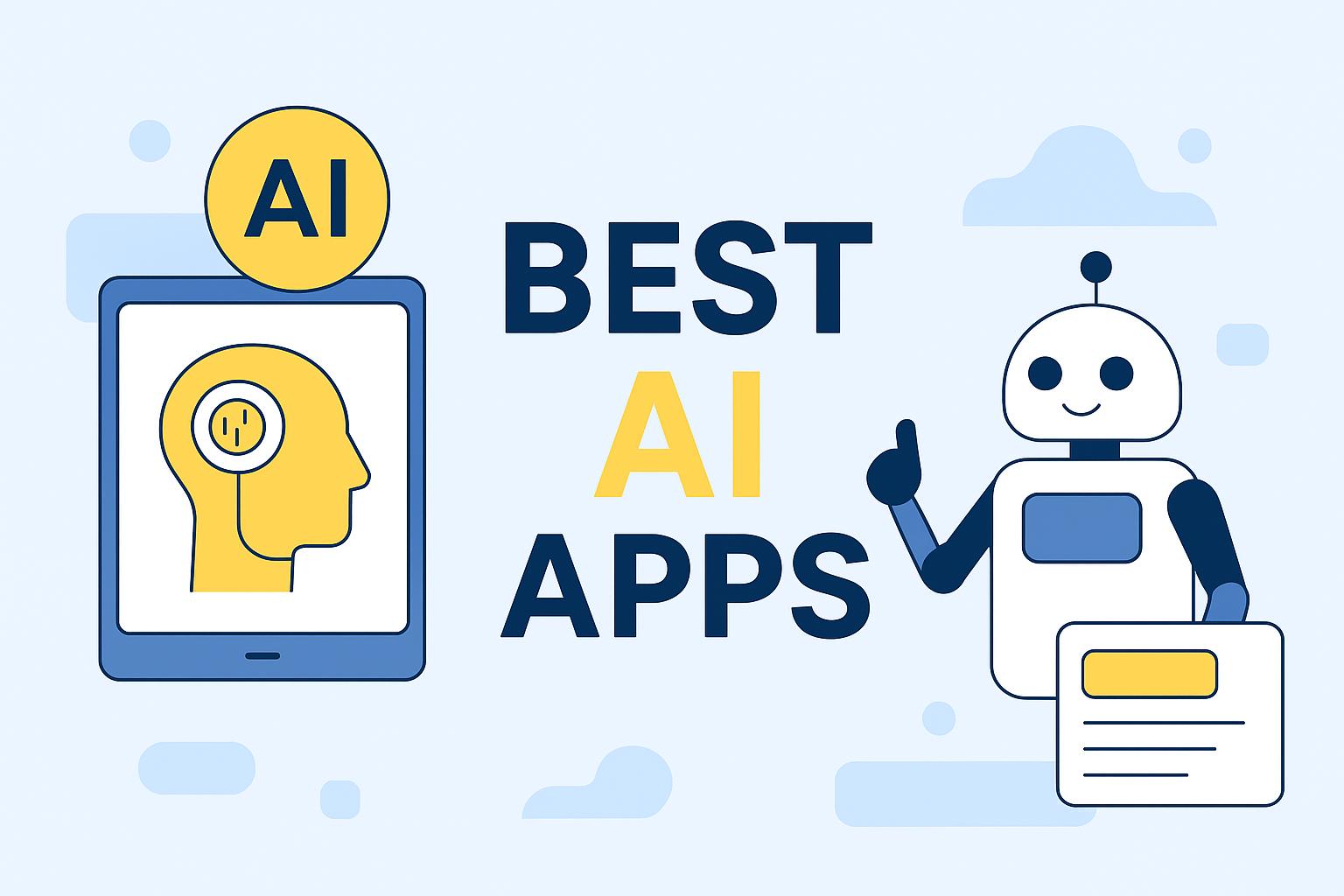In 2026, AI isn’t a sci-fi novelty — it’s the backbone of tools that streamline, uplift, and transform daily life. To rank on page one for “best AI apps,” this guide walks you through the most impactful types, the risks of not using AI, how to get started smartly, and the top AI apps you should know — all without copying existing material.
Artificial intelligence is no longer something futuristic or optional. From writing and research to managing busy schedules and maintaining personal well-being, AI apps have become the invisible support system many of us rely on. These tools don’t replace your capabilities; they enhance them, helping you move faster, think clearer, and stay organized without constant manual effort.
If you are looking to simplify life, boost productivity, or gain a competitive edge in your personal or professional journey, the right AI apps can be game-changing. This article highlights the ten best AI apps that stand out in 2026, based on usefulness, reliability, innovation, and real-life impact, so you can choose the ones that fit your goals.
Start your journey with Fhynix today!
Five Types of Best AI Apps
AI apps are everywhere, but only a few categories truly reshape how we work, learn, and live. These tools don’t replace human judgment—they remove friction, save time, and improve focus. Here are five of the most impactful types, with real-world examples.
1. AI Writing & Content Creation Tools
Example:
A freelance writer uses Jasper AI or Notion AI to generate a solid first draft in minutes, then refines it with their own voice and insights. What once took 4–5 hours now takes about 45 minutes.
Impact:
Time saved can be redirected toward deeper research, creative strategy, client outreach, or rest—improving both output and well-being.
2. Smart Productivity & Scheduling Automators
Example:
Apps like Fhynix or Motion automatically prioritize meetings, tasks, and routines. If a parent gets a last-minute work call, AI rebalances the schedule so important reminders—like school pickup—aren’t missed.
Impact:
Reduces decision fatigue, aligns personal and professional priorities, and helps build consistent habits through intelligent routines.
3. Voice-Activated Personal Assistants
Example:
Using Braina or Siri Shortcuts, a user dictates: “Summarize today’s notes and email them to my team” while commuting. AI transcribes, summarizes, and sends the message automatically.
Impact:
Transforms “dead time” such as commutes or walks into productive—or restorative—moments without screen dependency.
4. Ambient Wellness & Focus Apps
Example:
With Endel, a remote worker enables Focus Mode, and the app generates adaptive soundscapes based on time of day and even heart rate. As stress rises, the audio shifts to calmer tones.
Impact:
Provides science-backed focus and relaxation without juggling playlists, ads, or distracting content.
5. AI-Powered Research & Insight Generators
Example:
A student uploads a 200-page thesis into PDFgear AI and asks: “What are the three main arguments in this paper?” Within seconds, they receive a concise summary with references.
Impact:
Cuts through information overload, making learning, analysis, and decision-making faster and more precise.
Drawbacks of Not Using AI
Skipping AI doesn’t just mean sticking with the old way—it can lead to lost opportunities, inefficiency, and stress. Also keep in mind, AI can only help when your intent and priorities are set. Here’s how:
1. Time Drain from Repetitive Work
Without AI:
A marketer spends 2 hours manually resizing and editing social media images in Photoshop.
With AI:
Generative Fill completes edits in seconds.
Consequence:
Manual repetition consumes time that could be spent on strategy, experimentation, or creative innovation.
2. Overwhelm & Mental Clutter
Without AI:
A lawyer manually reviews 400 pages of a contract to identify key clauses and risks.
With AI:
Contract analysis tools like Harvey AI instantly highlight risks and critical sections.
Consequence:
Without AI support, stress increases, deadlines slip, and the likelihood of human error rises.
3. Inconsistent Routines & Burnout
Without AI:
A student relies on memory to manage study sessions and breaks, leading to overwork or procrastination.
With AI:
Fhynix nudges them with timely reminders: “Take a 5-minute walk now.”
Consequence:
Without AI-driven structure, burnout creeps in and productivity becomes erratic.
4. Difficulty Scaling Focus
Without AI:
A remote worker uses generic YouTube playlists. Ads and irrelevant tracks constantly disrupt concentration.
With AI:
Brain.fm dynamically generates music optimized for deep focus.
Consequence:
Without AI, sustaining flow states becomes harder, leading to fragmented work and wasted effort.
5. Suboptimal Decision-Making
Without AI:
A startup founder reads a few blog posts before pitching investors, missing key market signals.
With AI:
Tools like Perplexity AI or AlphaSense synthesize trends, competitor insights, and data in minutes.
Consequence:
Without AI, decisions are slower, less informed, and carry higher risk.
Five Beginner-Friendly Prompts—What Works (and What Doesn’t)
Getting started with AI is easier when your prompts are precise. Here’s how to sharpen them:
Key: Prompts that include goals, context, tone, and timeframe unlock AI’s potential.
The 10 Best AI Apps to Supercharge Your Life in 2026
Here’s a curated list of the top AI apps across categories—from who it’s for to pricing and competitors:
1. Fhynix

stands out as one of the most forward-thinking productivity apps of 2026. Instead of separating tasks and events the way traditional to-do list apps do, Fhynix merges them into a single calendar timeline. This creates a clear picture of your day and prevents the overwhelm that comes from juggling scattered lists.
With natural language input, you can add events or tasks simply by typing or speaking—for example, “Call the bank tomorrow at 11 AM,” and it instantly places the item in the right slot. It offers WhatsApp reminders for calendar events, integrates with major external calendars, and supports smart scheduling, offline notes, habits, and routines. For professionals, students, and families seeking real clarity, Fhynix becomes the hub where their entire day is visually organized.
2. Notion AI
Notion AI transforms scattered notes into an organized digital workspace. It helps you create structured documents, summarize long pages, rewrite content, analyze ideas, and manage projects within a single system. The power of Notion lies in its ability to convert raw information into clean, actionable pages—making it ideal for creators, teams, and students who handle large volumes of notes. Instead of manually organizing everything, the AI does the heavy lifting and lets you focus on thinking, not sorting.
- What it is: Context-aware writing assistant embedded in Notion.
- Best for: Knowledge workers juggling notes, goals, and content in one space.
- Why better: Auto-generates summaries, tasks, and drafts inside your saved context. Supports 70+ SaaS integrations.
- Pricing: Free tier; AI features around $8–16/month.
- Competitors: Evernote AI, Obsidian AI.
3. Endel
- What it is: Personalized ambient soundscapes syncing to user context.
- Best for: Remote workers, parents, or dreamers needing focus or relaxation.
- Why better: Real-time, adaptive sound based on heart rate or weather.
- Pricing: ~$4.99/month or one-time purchase.
- Competitors: Brain.fm, Calm.
4. Photoshop Generative Fill
- What it is: AI-powered image editors embedded in the Adobe suite.
- Best for: Designers or content creators needing quick edits.
- Why better: Reduces manual editing time—boosts creative flow.
- Pricing: Adobe Creative Cloud plans.
- Competitors: Affinity Photo, GIMP (with plug-ins).
5. PDFgear AI
- What it is: PDFs with AI chatbots for interactive Q&A.
- Best for: Researchers, students, lawyers, and any one wrestling with long documents.
- Why better: Instant clarity, in-context answers—no page flipping.
- Pricing: Freemium with premium tiers.
- Competitors: Adobe Acrobat AI, Foxit AI.
6. Microsoft 365 Copilot
- What it is: AI assistant inside Outlook, Word, Excel, Teams.
- Best for: Office workers needing polished output fast.
- Why better: Deeply integrated with existing tools—AI that lives where you work.
- Pricing: Enterprise-level licensing.
- Competitors: Google Workspaces Smart Compose, Grammarly business.
7. Healthify Me
- What it is: AI-driven personal health coach for meals and fitness.
- Best for: Wellness seekers wanting customized plans that respect their pace.
- Why better: Adaptive and personalized, unlike one-size-fits-all diets.
- Pricing: Freemium + coaching tiers.
- Competitors: MyFitnessPal, Lifesum AI.
8. Wysa / Youper
- What they are: Emotional support chatbots with therapeutic style check-ins.
- Best for: Those seeking emotional routines: reflection, gratitude, mindfulness.
- Why better: Accessible, conversation-based mental wellness tools.
- Pricing: Freemium with additional content packs.
- Competitors: Woebot, Replika.
9. GitHub Copilot
- What it is: AI pair programmer integrated into developer workflows.
- Best for: Software devs wanting smarter, quicker code assistance and corporate use of AI is soaring
- Why better: Speeds up dev by 55.8%, according to experiments.
- Pricing: ~$10/month.
- Competitors: TabNine, Amazon CodeWhisperer.
10. Perplexity AI
- What it is: AI-powered conversational search with citations and AI assistant features.
- Best for: Students, professionals, researchers needing fast, reliable answers.
- Why better: Synthesizes web and documents with sources—smarter than traditional search.
- Pricing: Freemium; Pro tiers available.
- Competitors: ChatGPT Search, Claude.
11. Braina
- What it is: Voice command assistant for Windows with automation capabilities.
- Best for: Power users seeking hands-free productivity on their PC.
- Why better: Local and cloud AI for voice control, speech-to-text, automation, and image generation.
- Pricing: Braina Lite (free), Pro/Pro Ultra tiers.
- Competitors: Windows Cortana, Dragon NaturallySpeaking.
5 Podcasts to Get Started with AI Apps and Stay Ahead
Sometimes the best way to learn about AI apps isn’t through blogs or tutorials, but by listening to the people building, researching, and experimenting with them. Podcasts offer bite-sized, real-time insights on how AI is evolving. Here are 5 top picks:
Practical AI
- What it is: A podcast focused on making AI approachable and useful for everyone—from developers to everyday app users.
- Why it matters: Great for people who want hands-on, real-world applications of AI without drowning in jargon.
- Good episode to start with: “AI Agents and the Future of Productivity.”
The TWIML AI Podcast (This Week in Machine Learning & AI)
- What it is: Sam Charrington interviews AI innovators and digs into how AI is applied in business and research.
- Why it matters: Especially strong on use cases in health, finance, and productivity—great if you’re curious about where AI apps are headed.
- Good episode to start with: “AI in Everyday Workflows.”
The AI Podcast The AI Breakdown https://open.spotify.com/show/7gKwwMLFLc6RmjmRpbMtEO
- What it is: Daily news and analysis of the latest in AI, hosted by Nathaniel Whittemore.
- Why it matters: If you don’t have time for deep dives but want to stay up to speed on trends and controversies, this one is gold.
- Good episode to start with: “AI Apps That Are Changing How We Work in 2026.”
Exponential View with Azeem Azhar
- What it is: A broader tech and society podcast that often focuses on AI’s impact on business, economics, and daily life.
- Why it matters: Excellent for listeners who want to understand AI apps in context—not just how they work, but how they change the world.
- Good episode to start with: “How Generative AI Is Reshaping Knowledge Work.”
How to Start Using AI Apps Effectively
The key to benefiting from AI is intentional use. Start with just one or two apps instead of trying everything at once. Integrate them naturally into your routine—use an AI planner to organize your day, an AI writing tool for communication, and an AI research assistant for study or work.
Over time, these tools will feel like an extension of your workflow. Combine AI’s speed with your personal judgment, and always review important details. Ensure your privacy settings are updated so your data remains safe.
Common Mistakes to Avoid When Using AI Apps
The most common mistake is relying on too many tools simultaneously, which leads to confusion instead of clarity. AI should simplify your life, not complicate it. Another mistake is trusting AI-generated information without verifying essential facts.
AI is powerful, but not perfect. Users should also avoid expecting automation to handle everything—your creativity and decision-making still matter. Finally, neglecting privacy settings can expose sensitive data, so reviewing permissions is crucial.
Conclusion — AI Is Your Competitive Edge in 2026
AI apps have become essential for managing life in a fast-paced world. They save time, reduce stress, enhance creativity, and help you stay organized with minimal effort. Choosing the right combination of tools can transform your productivity and personal growth.
If you want clarity in your daily structure, a calendar-first planner like Fhynix offers the strongest foundation by bringing your tasks and events together in a unified timeline. Combine that with smart writing, research, and creative tools, and you’ll be well-equipped to thrive in 2026.

